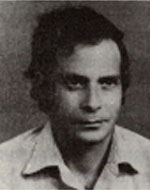Pindling, Dr. Yoav (Israel)
Yoav, the son of Sarah and Alexander, was born on August 19, 1936 in Haifa, when he was about two years old, and parents decided to travel to Poland to visit their family and take Yoav with them shortly after their arrival. The war broke out in Poland in 1941. By 1941 the family had taken over the city of Stry, which had been occupied by the Russians, and the Jews were forced to disguise themselves as Christians, but they were not safe and lived in fear of informers, One day the father left the house and did not return, and then the mother decided to flee to Warsaw, and Warsaw was in constant danger. At the end of 1946, the mother and her son left Poland and in January 1947 they arrived in Israel, and Yoav, 10 years old, settled in Ramat Hasharon, where they lived. Where his grandparents lived Yoav entered the Ussishkin elementary school in Ramat Hasharon, with a much lower level of knowledge than his friends. But thanks to his diligence, his quick grasp and his diligence, he became one of the best students in his class. He completed six years of schooling in only four years. But he devoted his time not only to studies. He was also the correspondent of Haaretz, and secretly wrote poems, two of which were published in the newspapers. In the school he was appointed to serve as a paw for the entire class, after being discovered as a boy with a sense of justice, who fought for the underprivileged. His teachers called him “the conscience of the class” because he always came to the aid of the weak. After graduating from elementary school, he moved to the New High School in Tel Aviv where he graduated. Yoav was drafted into the IDF in late August 1955 and assigned to the Givati Brigade, and after completing basic training he was sent to the course of the Education Ministry and was appointed military correspondent. During the Sinai War he served as a military correspondent and was awarded the “Chinese Sign”. In 1957, while still a soldier, he married a wife and began to study sociology and political science at the University of Jerusalem. After three years of study, he was awarded the B.A. degree, and his academic work for this degree won a prize. He then decided to study clinical psychology. At that time there was no such course in Israel and he decided to go to the United States and study there. He had a difficult life and had to study and work to support himself and his wife. Without connections and without help he worked and studied and succeeded. In 1965, he studied at the Metropolitan Hospital in New York, where his first daughter was born. In 1970 he was admitted as a Doctor of Clinical Psychology, and his second daughter was born. He was sent to work in the mental health department of Kaplan Hospital, where he was discovered at full height, and he worked tirelessly, saving time and effort for the sick. Yoav spent most of his time and the best treatment he could give him, and he wrote extensively in his profession, especially in English, and his only article in Hebrew on psycholinguistics and pedagogy was published in the booklet “From the Workshop.” He served in various positions on the Sinai front and even reached the western part of the Suez Canal at the end of 1977. During the war, He returned to his home, exhausted and exhausted, and returned to work at the hospital, but five weeks later he was again recruited by the army and sent to Beit Nissan in Netanya to treat soldiers who were mentally wounded in the war. His medical colleagues said they had comeYoav served as a source of encouragement and assistance to many. On the 24th of Adar 5734 (24 February 1974) Yoav died of a Lev attack while serving in the military section of the Kiryat Shaul cemetery, leaving behind a wife, two daughters and a mother. . In a letter of condolence to the bereaved family, his commander wrote: “During the period in which he worked in our unit, Yoav was a sensitive and gifted psychologist who not only knew how to help others in his pain and distress, but shared with him all his spirit and soul. His deep knowledge and his approach to his friends, profession and service. ” After his death, many letters from his patients were received in his family’s home, and everyone praised him and thanked him for his work for them.
